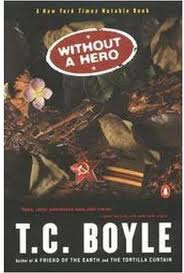Without a Hero
Summary (from the publisher): A critic recently said of T. Coraghessan Boyle, "More happens in one of Boyle's stories than in most post-Victorian novels." This is precisely the case in Without a Hero, fifteen stunning stories that each, in its own way, displays a virtuosity and versatility rare in literary America. In this, his fourth story collection, Boyle takes chance after chance, even to the point of reexamining the ethos of Ernest Hemingway, one of the masters of the form. In "Big Game," the wild animal safari takes place not in Africa but on a pay-per-shoot ranch in Southern California and includes an elephant hunt and its vivid consequences. There are echoes here of Hemingway's classic "The Short Happy Life of Francis Macomber" and Green Hills of Africa, but Boyle's hunting story is drawn for the age of ecology rather than an age without limits. Throughout, Boyle displays an astonishing range as he zooms in on such American specimens as the college football player who knows only defeat; the entrepreneur who creates a center for acquisitive disorders; the couple in search of the last toads on earth; and the boy caught between the ingenuousness of childhood and the cynicism of adulthood in "The Fog Man." In some of these stories, Boyle makes you laugh out loud; in others you come closer to understanding the human condition because of the way he cuts to the secret places in his people's hearts. Here is the author of the highly praised 1993 novel, The Road to Wellville, entering a richer and deeper phase in his writing life, his stories bursting with what the Los Angeles Times has called his "ferocious, delicious imagination, often darkly satirical and always infatuated with language."
Review: I always struggle writing reviews for short story collections because I could write separate reviews for each one of the 15 stories included in Boyle's Without a Hero. This is the second set of short stories I've read by T.C. Boyle, the first being Tooth and Claw. Of the two, I definitely preferred this one. Boyle has a way of capturing the absurdity of human life and through absurd situations show emotions and thoughts that are universal human emotions. Boyle creates stories that demonstrate how strange and weird life can be. I love the way Boyle describes the worlds he creates; "a big blocky old lady with a face like the bottom of a hiking boot." Most of these stories made me feel uncomfortable or tense. For example, the eery experience of being stalked by a weirdo while living in a glass box in "Sitting on Top of the World" and the absurd horror of shooting African game on a faux safari in California in "Big Game." My general reaction to every story is something along the lines of "what the heck??" and then rapidly reading to the conclusion. Boyle is a master of capturing multitudes of different feelings and individuals who all have an underlying common humanness about them. A very talented and creative writer.
Stars: 4



Comments
Post a Comment